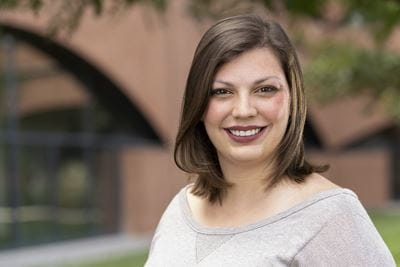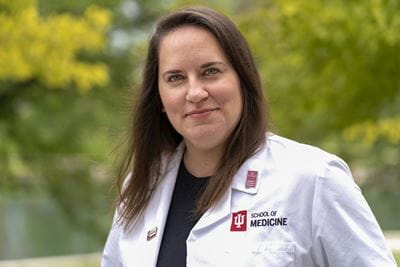Two women pursuing their medical degrees with an interest in combining cancer research with patient care have been selected as the 2020 IU Simon Comprehensive Cancer Center William J. Wright Scholarship Fund recipients.
Alexa Loncharich and Laura Wright (no known relation to the benefactor) earned the $8,000 scholarships for the current academic year. Each has already distinguished herself by delivering presentations at scientific meetings, earning numerous awards, taking on volunteer projects, and getting listed as an author on research published in prestigious academic journals among other accomplishments.
Loncharich, a native of Carmel, Ind., wrote in her scholarship application that she discovered her love for oncology while standing in the corner of a small conference room. The moment happened while in a pancreatic oncology clinic when she and her preceptor met with their last patient of the day. The patient, who two days earlier went to the ER, had a mass on her pancreas. It was advanced pancreatic cancer.
“I think the poor prognosis of pancreatic cancer really inspired me to pursue research involving it,” Loncharich said. “I wanted to get involved in improving survival and treatment.”
For her most recent research, which she completed in the lab of Michael House, M.D., she reviewed about 850 patient charts.
“We looked at patients that had a surgery called a Whipple, which removes the head of the pancreas,” she explained. “This is often done to remove cancer in the pancreas. We wanted to determine if an early complication, biliary leak, is associated with a later complication, biliary fistula. A biliary fistula carries a high risk of additional morbidity and mortality.”
For her most recent research, which she completed in the lab of Michael House, M.D., she reviewed about 850 patient charts.
Their finding? Postoperative biliary fistulas—even transient, clinically insignificant fistulas—are associated with increased risk for developing a late biliary stricture that needed stents.
The significant finding caught the Society for Surgery of the Alimentary Tract’s attention, and it was accepted for an oral presentation at the society’s 61st annual meeting. Because of the pandemic, the meeting was canceled but the findings were presented online during a webinar presented by the society. The research also was published in the Journal of Gastrointestinal Surgery.
Also because of the pandemic, Loncharich and her fellow students were pulled off of their clinical rotations in mid-March. However, she said that allowed her more time to devote to research. In fact, she focused solely on a surgical elective for a month.
She returned to her internal medicine sub-internship in July at the Roudebush VA Medical Center.
The fourth-year medical student plans to apply to internal medicine residencies this fall followed by a hematology/oncology fellowship. She said she plans to continue pursuing research into her residency and beyond.
Loncharich graduated with highest distinction from IU Bloomington with a double major in neuroscience and biology in 2017. She currently serves as a tutor at IU School of Medicine and is a member of the school’s Association of Women Surgeons Student Interest Group and the Surgery Student Interest Group. She serves as vice president of the school’s Internal Medicine Student Interest Group.
“It is such an honor to receive this award,” she said. “I am thrilled for the recognition of my previous research and the judges’ confidence in my future research. The scholarship also allows me to devote more time on research.”
Laura Wright pursues research on cancer’s impact on musculoskeletal system
A personal interest led Wright to IU to study with Theresa Guise, M.D., widely recognized as a leader in how cancer affects bone. (Guise recently left IU for MD Anderson Cancer Center.)
Wright lost a family member to metastatic breast cancer. That death led the Portland, Ore., native to change her dissertation focus to breast cancer bone metastasis while a Ph.D. student at the University of Arizona. She earned her doctorate in physiological sciences in 2012.
Now Dr. Wright, a third-year student at IU School of Medicine, is set to become a medical doctor in 2022.
In the Guise lab, her research focused on the impact of cancer and cancer therapies on the musculoskeletal system. In 2016, she was promoted to an assistant research professor of medicine at IU School of Medicine. She earned funding from the Department of Defense and the American Cancer Society for her research, an impressive feat for a student.
“A portion of my work has focused on understanding how cells inside the bone microenvironment can influence cancer growth and progression,” she said. “We’ve found that factors secreted from bone marrow can change gene expression of breast cancer cells and may contribute to its growth and ability to migrate.”
She added: “I’ve also investigated how cells in bone are affected directly and indirectly by radiation therapy, which is often a necessary treatment for prostate and breast cancer patients. Many women experience muscle weakness and bone loss with breast cancer treatments that antagonize the estrogen receptor or block estrogen synthesis altogether, so I am currently working on a project that compares two of these drugs head-to-head in order to characterize their effects on muscle function and bone metabolism.”
The love of combining bench research with the ability to care for patients at the bedside led her to leave the lab and to enroll in medical school two years ago. She’s currently at Riley Hospital for Children on her first clinical rotation, following the pandemic’s shutdown of in-person classes and clinicals.
However, Wright saw a “silver lining” in the change because it gave her more time to focus on reading and writing related to her lab work before classes resumed online.
Still, the clinical experience makes her most happy. “It’s a joy to finally be where I set out to be: with patients,” she said. Wright also said her “number one goal is to become a well-rounded and capable clinician.”
After medical school, Wright plans an internal medicine residency followed by a fellowship in hematology/oncology.
Co-director of the Eskenazi Health Center West 38th St. Health Fair, Wright is a member of IU School of Medicine’s Internal Medicine Student Interest Group and the American Association for Cancer Research.
“I was thrilled to receive the William J. Wright Scholarship because it will give me the opportunity to reconnect with the Guise Lab during my fourth year of medical school to finalize my project aimed at understanding how signals from bone marrow can impact breast cancer behavior and metastasis.”
William J. Wright Scholarship
Learn more about the IU Simon Comprehensive Cancer Center’s William J. Wright Scholarship Fund.
